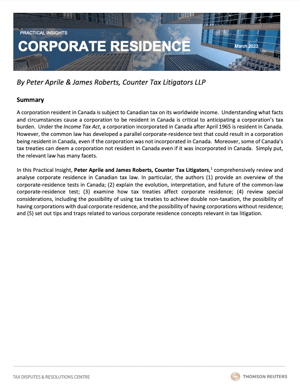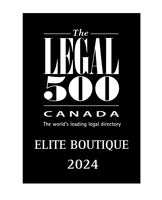
* Thomson Reuters regards the authors as individuals with expertise in tax and litigation. Thomson Reuters has published five Practical Insight chapters on different tax controversy topics, which Counter partners have written. This content originally appeared in one of those Practical Insights chapters.*
 With the increase in e-commerce and the fact that corporate residence is corporation-specific, it is possible to create a corporation that is not resident anywhere. However, there are tax implications for corporations operating in Canada without a physical presence.
With the increase in e-commerce and the fact that corporate residence is corporation-specific, it is possible to create a corporation that is not resident anywhere. However, there are tax implications for corporations operating in Canada without a physical presence.
Corporate Tax Residence and E-Commerce
A corporation is not required to have an office or employees in the country in which it provides services or earns revenue. This allows corporate groups that engage in e- commerce to select jurisdictions that may reduce the corporate group’s tax burden.
For example, consider a corporation that earns revenue, but does not have a physical office, employees, executive officers, or ongoing business operations (Corporation X). This type of corporation can exist in a corporate group in which related corporations undertake the necessary business activities to produce, market, and sell services, and the group funnels that revenue to Corporation X. In the appropriate jurisdiction, Corporation X might pay little to no corporate tax.
Apple's Corporate Tax Residence: A Case Study
In fact, this is precisely what the Apple corporate group achieved.1 Apple Inc. (Apple Parent) is a corporation resident in the United States. Apple Parent incorporated subsidiary corporations in Ireland (Apple Sales International and Apple Operations Europe). Apple Sales International and Apple Operations Europe had the right to manufacture and sell Apple products outside of the Americas. Apple Sales International created a satellite or branch that it referred to as its “head office”.
Under Irish law, an Irish corporation could establish a satellite or branch office (the branch) outside of Ireland and allocate any amount of the corporation’s profits to that branch. Under Irish tax law, profits allocated to the branch were taxable where the branch operated and not in Ireland (unless the branch operated in Ireland).
Apple Sales International’s branch was virtual: it was not based in any country and existed only in the cloud. It did not have a physical office or any other premises and had no employees. Its only activity was infrequent meetings of the board of directors.

Apple Sales International allocated the majority of its profits from sales outside of the Americas to the branch. The profits allocated to the branch were not taxable in Ireland and were not taxable in the United States. According to the European Commission Press Release Database, Apple Sales International paid corporate tax in Ireland equal to approximately 0.05 percent in the 2011 fiscal year and approximately 0.005 percent in the 2014 fiscal year. By any measure, this constitutes aggressive tax planning.
In Canada, the transfer-pricing provisions, at section 247 of the ITA, would have allowed the Agency to attack the Apple group’s aggressive tax-planning strategy.
In Europe, The European Commission conducted an investigation and concluded that Ireland’s tax law related to allocating profits to a branch had the effect of granting undue benefits to Apple Sales International — i.e., Apple Sales International paid a minimal amount of corporate tax.2
Granting an undue benefit was illegal under the European Union state-aid rules, and the Irish tax authority was required to seek unpaid taxes from Apple Sales International. Specifically, the Irish tax authority had to reallocate Apple Sales International’s profits between its Irish operations and its branch (in the same way that the Agency would determine the appropriate transfer price between a Canadian corporation and a non-arm’s-length foreign corporation).
Corporations Without Tax Residence in Canada
The authors believe that, in most cases, if a corporate group shifts its profits to a corporation (or branch of a corporation) that is without residence, the Agency’s primary argument will be that the transfer-pricing provisions allow the Agency to tax the appropriate amount of the corporate group’s profit in Canada (and the Agency will impose transfer-pricing penalties under section 247 of the ITA). However, the facts of the specific situation may also allow the Agency to argue that the corporation supposedly without residence is in fact resident in Canada, thereby subjecting the corporation’s profits to tax in Canada.
Citations
1 See <http://europa.eu/rapid/press-release_IP-16-2923_en.htm> for European Commission press release related to Apple’s illegal tax benefits [European Commission].
2 Ibid.

.jpg?width=120&name=Counter%20Tax%20Litigators%20Logo%20Stacked%20(MidnightBlue%20on%20White).jpg)












.png?width=400&height=400&name=CT-How_Can_We_Help-22_july_NewGraphic_b(small).png)

.png?width=1386&height=1224&name=2025%20Legal500%20Elite%20Boutique%20Award%20(Badge).png)
.png?width=1386&height=1224&name=ITR%20Finalist%20Practice%20Leader%20of%20Year%20Peter%20Aprile%202024%20(Badge).png)
.png?width=1386&height=1224&name=2025%20Legal500%20Leading%20Firm%20Client%20Satisfaction%20Award%20(Badge).png)





.png?width=1386&height=1224&name=ITR%20Tax%20Innovator%20Finalist%202024%20Award%20(Badge).png)




